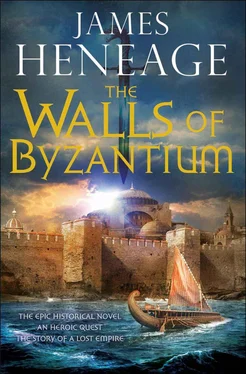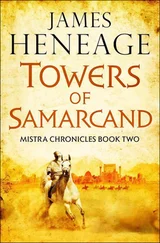James Heneage - The Walls of Byzantium
Здесь есть возможность читать онлайн «James Heneage - The Walls of Byzantium» весь текст электронной книги совершенно бесплатно (целиком полную версию без сокращений). В некоторых случаях можно слушать аудио, скачать через торрент в формате fb2 и присутствует краткое содержание. Жанр: Исторические приключения, на английском языке. Описание произведения, (предисловие) а так же отзывы посетителей доступны на портале библиотеки ЛибКат.
- Название:The Walls of Byzantium
- Автор:
- Жанр:
- Год:неизвестен
- ISBN:нет данных
- Рейтинг книги:3 / 5. Голосов: 1
-
Избранное:Добавить в избранное
- Отзывы:
-
Ваша оценка:
- 60
- 1
- 2
- 3
- 4
- 5
The Walls of Byzantium: краткое содержание, описание и аннотация
Предлагаем к чтению аннотацию, описание, краткое содержание или предисловие (зависит от того, что написал сам автор книги «The Walls of Byzantium»). Если вы не нашли необходимую информацию о книге — напишите в комментариях, мы постараемся отыскать её.
The Walls of Byzantium — читать онлайн бесплатно полную книгу (весь текст) целиком
Ниже представлен текст книги, разбитый по страницам. Система сохранения места последней прочитанной страницы, позволяет с удобством читать онлайн бесплатно книгу «The Walls of Byzantium», без необходимости каждый раз заново искать на чём Вы остановились. Поставьте закладку, и сможете в любой момент перейти на страницу, на которой закончили чтение.
Интервал:
Закладка:
The Varangians had grown rich in the service of their emperor. When a city was taken, it was the Varangians who’d had first pick of the spoils. When a new emperor came to the throne, it was the Varangians who’d been permitted to fill their helmets with gold.
Luke knew that, on a night of fire and ruin, a treasure had been brought to Mistra by four Varangians, led by his ancestor, and buried somewhere on its hill. It was a treasure they said might save the empire one day, a treasure the Varangians and their descendents had vowed to guard until it was needed. It was the reason why they were still there. When the Norman Villehouardin had conquered the Peleponnese and built his citadel at Mistra, their sons had been forced to go to Monemvasia. But the secret of where the treasure lay buried in Mistra stayed with them, passed from father to son through the generations.
Until.
Until when? When had the chain been broken? Luke wasn’t sure. Somehow the secret of where it was had been lost so that now no one quite knew what was history and what myth.
Tonight, the four Varangians and their sons would meet as they did once a year to talk about myth and history and an island on the edge of the world called England . And they would renew their oath of loyalty to an empire that had given them a home.
On reaching the alleyway outside his house, Luke broke into an easy run, taking two at a time the steps that led up to the mesi odos , the cobbled central street of the town. The shops and taverns were still boarded up and sleepy traders mumbled greetings as he passed.
He reached the square that formed the crossroads with the street that led from the sea gate to the upper town. At the church of Christ Elkomenos, he turned left, nearly colliding with a water seller who was filling cups suspended on a rope around her neck.
Luke rounded a corner and saw before him the steps to the upper town. Soon he was catching his breath at the top, leaning against the balcony that overlooked the maze of streets below and the sea beyond. Here there were fewer people, fewer cats and much less noise. Here you weren’t brushed by pack-mules as you walked, or stopped by street hawkers trying to sell their wares. Here you could rest on a stone bench beneath the shade of a mulberry tree or sit for a moment on the cool edge of a fountain to collect your thoughts. And here you could gain an uninterrupted view of the vast canvas of sea on which were painted the motionless sails of vessels, large and small, which passed Monemvasia in the endless barter of continents, a barter in which his city played its important part.
Luke breathed in deeply. The plateau and surrounding mountains and valleys were covered in a spring blanket of narcissi, hyacinths and violets and the heady smell was all around him. What a difference from the lower town, where a waft of wind could pick up the stench of the tanneries, lime kilns and slaughterhouses that stood outside the walls. No wonder the Goulas was known as Manexie Kalessie, ‘castle of flowers’, and no wonder the rich chose to live here.
Luke crossed the square and started up the paved street towards the Panagia Hodegetria, the church that had provided a landmark for sailors for centuries. On either side of the street were the walls of great villas, the tops of cypress trees promising cool gardens within.
No one was up at this time except the old praetor, whose job it was to keep the streets of the upper town clean and lit at night. He was busy extinguishing the wicks of oil lamps along the walls. He knew Luke of old.
‘Wrong way for the palace,’ he said.
‘I’m to meet them at the citadel today,’ said Luke, stopping to catch his breath, ‘and they say the fleet is returned to Palea.’
‘It’s there all right. But the Archon won’t send it to help Mistra.’
The old man turned, wiping oil from his hands with a rag. ‘You might tell them there’s a beacon alight. As if they haven’t seen it.’ The man spat and turned back to his lamp.
That the Archon was unpopular in the city, Luke knew. What he hadn’t realised was just how much the citizens supported their new Despot, Theodore, sent to rule over them by his brother, the Emperor Manuel in Constantinople. Now the beacons had been lit and the people wanted to march to help defend their capital.
As I tried to do this morning .
By now Luke had arrived at the church and he climbed the rocks behind it, carefully avoiding a gossamer-thin spider’s web that stretched between two mulberry bushes. He bent to look at the beads of sparkling dew that hung from every taut thread and marvelled that anything so tenuous could resist the elements.
Perhaps the Empire can survive after all .
Looking away, he saw the blue expanse of the Mirtoon Sea before him, the coast to his left rising sharply as it swept round the edge of Monemvasia Bay. A mist still clung to the water and Luke strained his eyes to see the masts of the twelve galleys that were all that remained of the once-glorious Imperial Navy.
He shifted his gaze to the north, where the deep-water port of Kiparissi lay. Once it had contained shipyards that used the oak and pine from Mount Parnon, and the iron from the furnaces at Voutamas, to create ships of strength and beauty. The men of Monemvasia had provided much of the manpower for the navy but since the Emperor Andronikos had disbanded the fleet a hundred years ago, there were barely sufficient ships to protect the merchantmen that plied the shipping lanes to Constantinople, let alone fight the Turks.
Now most of the ships that Luke saw crossing the bay flew the winged lion of Venice, huge galleys with three banks of oars on either side whose sweeps dipped to the beat of a drum.
Wiping the sweat from his neck, Luke ran along the path that edged the north face of the rock. To his left the plateau fell away to fields containing neat rows of wheat and vegetables and the public cisterns. Luke hoped they were full.
Soon he was climbing the final slope to the rock on which the citadel stood. His path led round to the north edge of the plateau from where he could see the bridge that linked the island of Monemvasia to the mainland. The drawbridge at its centre was being lifted to allow a boat through to the jetties and quays beyond. Ships laden with wine, oil, silk, cochineal and the fruit of the Laconian soil would be waiting to leave.
‘Luke!’
He looked up to see a familiar face leaning over the battlement.
‘Late as usual, damn you!’ shouted Damian Mamonas. The Archon’s heir was a year older than Luke and stood to inherit the vast Mamonas empire. The knowledge made him arrogant. ‘My father is on the verge of not letting us ride to Sikia with the Turks on the march. Wait there. I’ll get Zoe.’
Zoe Mamonas: Damian’s twin in everything but temperament. While Damian was lazy, arrogant and shallow, Zoe had depths beyond the reach of man, or at least any man who’d tried to bind her in marriage these recent years. Zoe had rejected any suitor that might have eased the pain of knowing that she would inherit nothing.
They didn’t meet any Turks on the ride to Sikia and, if they had, the Turks would have been hard pressed to catch them. Like Luke, Damian and Zoe rode well, and all three were mounted on the best horses that the Mamonas stable had to offer.
They had met the horses at the town gate and had trotted through the outer town where lay the Jewish quarter and homes of the poorest inhabitants. Here were the glass factories, metal workshops and pottery kilns and Zoe held a handkerchief to her nose until they’d reached the custom houses and warehouses which clustered around the bridge. Crossing it, they’d come to the open field reserved for feast-day fairs, where you could watch bear baiting or buy a plate of suckling lamb, fresh from the spit. There you could find exotic goods from the outside world, the latest books and weapons from Florence or marten fur from the lands of the Golden Horde. And it was there that Luke felt, most strongly, the pull of somewhere else.
Читать дальшеИнтервал:
Закладка:
Похожие книги на «The Walls of Byzantium»
Представляем Вашему вниманию похожие книги на «The Walls of Byzantium» списком для выбора. Мы отобрали схожую по названию и смыслу литературу в надежде предоставить читателям больше вариантов отыскать новые, интересные, ещё непрочитанные произведения.
Обсуждение, отзывы о книге «The Walls of Byzantium» и просто собственные мнения читателей. Оставьте ваши комментарии, напишите, что Вы думаете о произведении, его смысле или главных героях. Укажите что конкретно понравилось, а что нет, и почему Вы так считаете.










